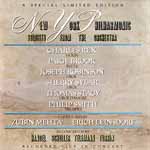
Shostakovich Piano Concerto #1
NY Times - Shostakovich Piano Concerto #1
Though Mstislav Rostropovich is one of the towering musicians of our time, as a conductor, even in his prime years, he has never been an incisive technician. Powerful musical instincts, an eternally youthful sense of adventure and a deep connection to the tradition are what have always mattered in Mr. Rostropovichs podium performances, especially in the Russian repertory.
On Wednesday night at the New York Philharmonic, Mr. Rostropovich, still spry at 78, conducted a program of works by Shostakovich and Prokofiev, including two concertos with the colossal, though always unpredictable, pianist Martha Argerich. Shostakovich and Prokofiev were teachers and mentors to the young Mr. Rostropovich in the Soviet Union. No conductor I can think of could have brought more passion and authority to these works that he did.
He began with Shostakovichs "Festive Overture," a six-minute work composed in 1954 for a concert to celebrate the 37th anniversary of the October Revolution. The score is generally considered an exuberant curtain-raiser, a riff on Rossini. But Mr. Rostropovich was having none of that. The performance he drew from the Philharmonic players was breathless and ecstatic, especially when he turned to the audience to signal two batteries of extra brass in the balconies to join in for the final push to the blazing coda.
Then Ms. Argerich appeared for a performance of Shostakovichs Concerto No. 1 in C minor for Piano, Trumpet and Strings (1933), with Philip Smith as the splendid trumpet soloist, followed by Prokofievs Piano Concerto No. 1 in D flat (1911). This volatile artist is often at her best in concertos, when her temperamental wildness is reined in by a conductor. But Mr. Rostropovich is not a reining-in sort. If anything, he emboldened Ms. Argerich to play with full-out intensity and maximum expressivity. At times in both works, things got a little rough.
But who cared when the performances were so exciting and dangerous? For all the restless fervor of her playing, Ms. Argerich managed to convey beautifully the Neo-Classical elements of the Shostakovich. Other pianists must surely marvel at her rippling scales, her light and nimble repeated chords, her ability to bring out a thumpy bass line in her left hand while executing filigree of unimaginable delicacy in her right hand.
She and Mr. Rostropovich were clearly inspiring each other in Prokofievs scintillating concerto, the composers first mature work, 20 minutes of music chock full of ideas. In the climax of the driving final section the coordination between the piano and the orchestra threatened to fall apart. But Mr. Rostropovich kept a steady hand and brought the work to its heady conclusion. The audience responded with a frenzied - you might say Argerichian - ovation.
The program ended with a glowing and vibrant, if not always exacting, account of Prokofievs wistful Symphony No. 7 in C sharp minor. Talk about connection to tradition: when Prokofiev completed this work in 1952, young Mr. Rostropovich was living with the composer and his wife.
By ANTHONY TOMMASINI
